
Understanding Negative DNA Test Results
Negative DNA test results can occur in paternity cases, medical diagnoses, or criminal investigations, often due to false negatives or limited test sensitivity, requiring further analysis.
Negative DNA test results indicate the absence of specific genetic markers or matches, often leading to confusion or relief depending on the context. In paternity testing, a negative result excludes an individual as the biological parent. Similarly, in criminal investigations, negative results can exclude suspects. Medical DNA tests may show the absence of genetic disorders or infections. However, false negatives can occur due to factors like sample contamination or test limitations. Understanding these results requires considering the test’s purpose, accuracy, and potential errors. Negative results can have legal, emotional, or medical implications, making it crucial to interpret them correctly with professional guidance. This section explores the basics of negative DNA test results and their significance across various scenarios.
The Science Behind DNA Testing and Negative Outcomes
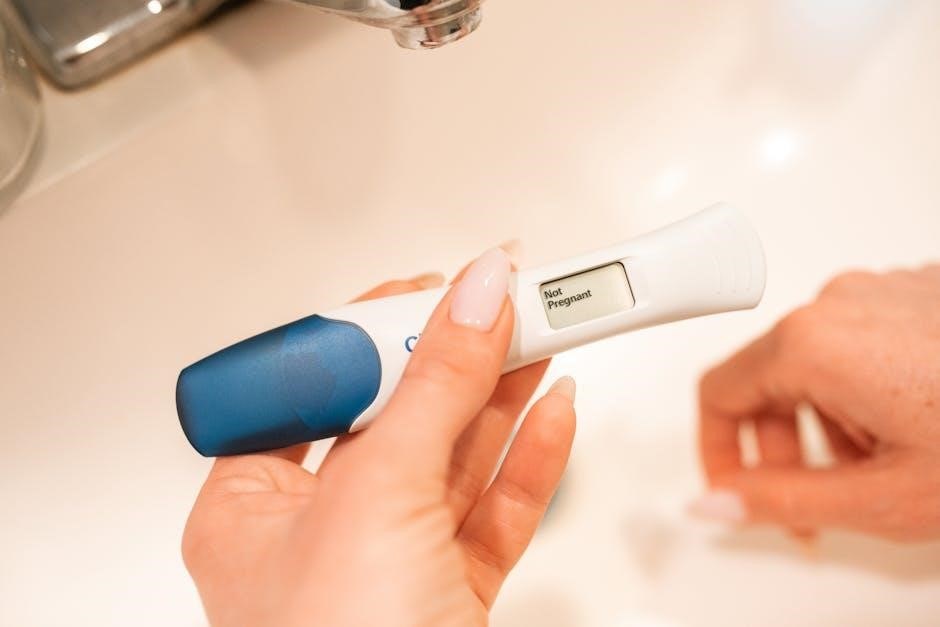
DNA testing relies on comparing specific genetic markers, such as short tandem repeats (STRs), to identify matches or exclusions. When a test yields a negative result, it means no shared genetic material was detected between samples. This could be due to biological unrelatedness, contamination, or technical limitations. Advanced techniques like PCR amplify DNA for analysis, but false negatives can occur if the sample is degraded or insufficient. In paternity testing, a negative result excludes an individual as the parent, while in medical diagnostics, it may indicate the absence of a mutation. Understanding the scientific principles behind these outcomes ensures accurate interpretation, addressing concerns about test reliability and potential false negatives.
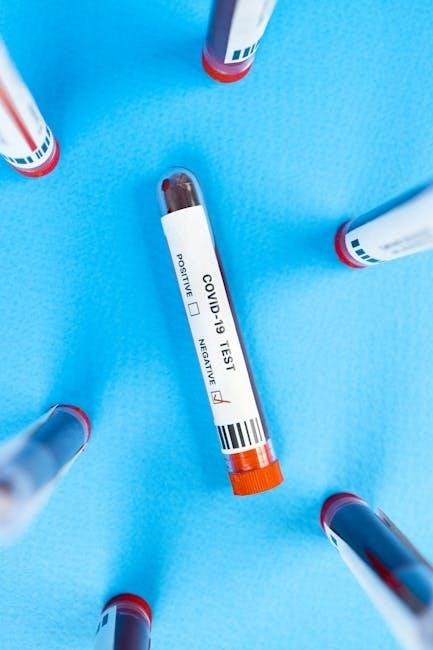
Implications of Negative DNA Test Results
Negative DNA test results can have legal, emotional, and medical consequences, affecting paternity disputes, criminal investigations, and health diagnoses, requiring careful interpretation and follow-up actions.
Legal and Investigative Implications
Negative DNA test results can significantly impact legal and investigative processes. In criminal cases, a negative result may exclude a suspect, requiring further investigation and alternative evidence. False negatives can lead to wrongful convictions or the failure to identify true offenders. Legal cases, such as paternity disputes, may rely heavily on DNA results, with negative outcomes potentially altering custody or child support decisions. Additionally, in cases involving genetic testing for hereditary conditions, a negative result might influence legal and financial planning. Accurate interpretation of DNA results is crucial to ensure justice and fairness, as misinterpretation can have severe legal consequences.
Psychological and Emotional Impact
Negative DNA test results can have profound psychological and emotional effects on individuals. In paternity cases, false negatives may lead to confusion, mistrust, or strained relationships. Unexpected results can cause emotional distress, especially when they contradict personal beliefs or expectations. For individuals undergoing genetic testing for medical conditions, a negative result may bring relief, but false negatives can delay diagnosis and treatment, leading to anxiety. Additionally, the emotional impact of negative results in criminal investigations or ancestry testing can be overwhelming, as they often challenge deeply held convictions or family narratives. It is crucial to provide counseling and support to help individuals cope with the emotional ramifications of negative DNA outcomes.
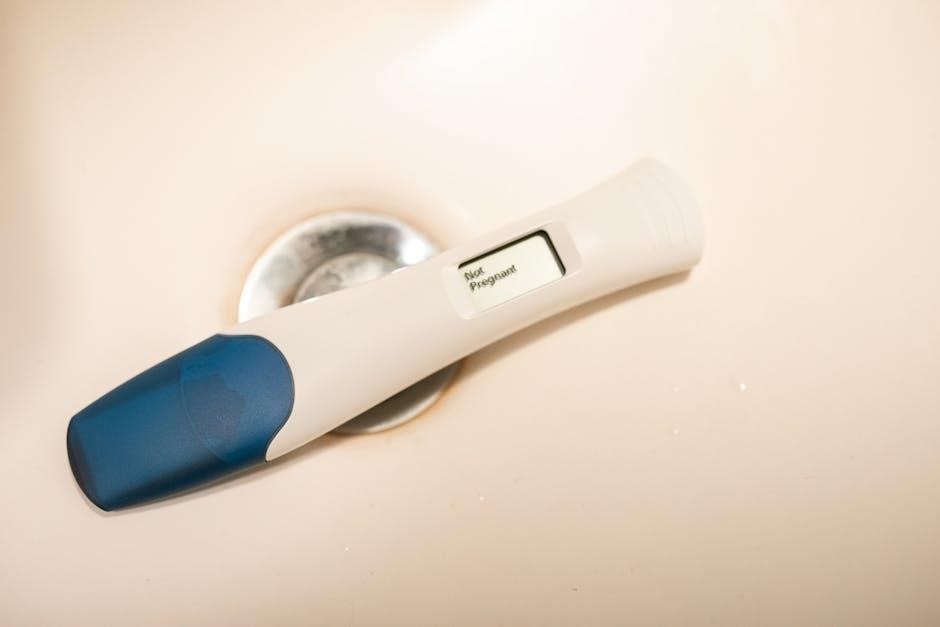
Common Scenarios for Negative DNA Test Results
Negative DNA test results often arise in paternity disputes, criminal investigations, and genetic disorder screenings. They can occur due to false negatives, human error, or insufficient sample quality.
Paternity Testing and False Negatives
In paternity testing, false negatives occur when a biological father is incorrectly excluded due to lab errors, sample contamination, or insufficient DNA markers. Such outcomes can lead to emotional distress and legal complications, as seen in cases where alleged fathers were later confirmed through retesting. For instance, in some regions, only a small percentage of paternity tests yield positive results, highlighting the rarity of true biological matches. False negatives may also arise from mutations or rare genetic conditions. It is crucial to ensure high-quality samples and consider retesting to confirm results, as false negatives can have significant psychological and legal ramifications for all parties involved.
Criminal Investigations and Exclusions
Negative DNA results in criminal investigations can exclude suspects, yet their interpretation requires caution. DNA testing may fail to detect traces due to degraded samples, contamination, or insufficient genetic material. In sexual assault cases, for example, negative results might not rule out the alleged perpetrator entirely, as other evidence like fingerprints or witness testimonies could still be relevant. Additionally, false negatives can occur if the test focuses on specific DNA markers that were not present in the sample. Investigators must consider the broader context, including other forensic evidence, to avoid wrongful exonerations or convictions. Proper handling and retesting of samples are essential to ensure accuracy and justice in such cases.
Genetic Disorders and False Negative Results
Negative DNA test results in genetic disorder screenings can be misleading, as false negatives may occur due to limitations in test sensitivity or incomplete gene panels. For instance, a test might miss specific mutations linked to conditions like colorectal cancer or inherited diseases. This can lead to delayed diagnoses or inappropriate treatment plans. False negatives often arise from poor sample quality, inadequate testing methods, or the presence of rare genetic variants not covered by the test. In such cases, individuals with a family history of a disorder may still require regular monitoring, even with a negative result. Genetic counselors play a crucial role in interpreting these results and recommending further testing or alternative screening methods to ensure accurate diagnoses and proper patient care.
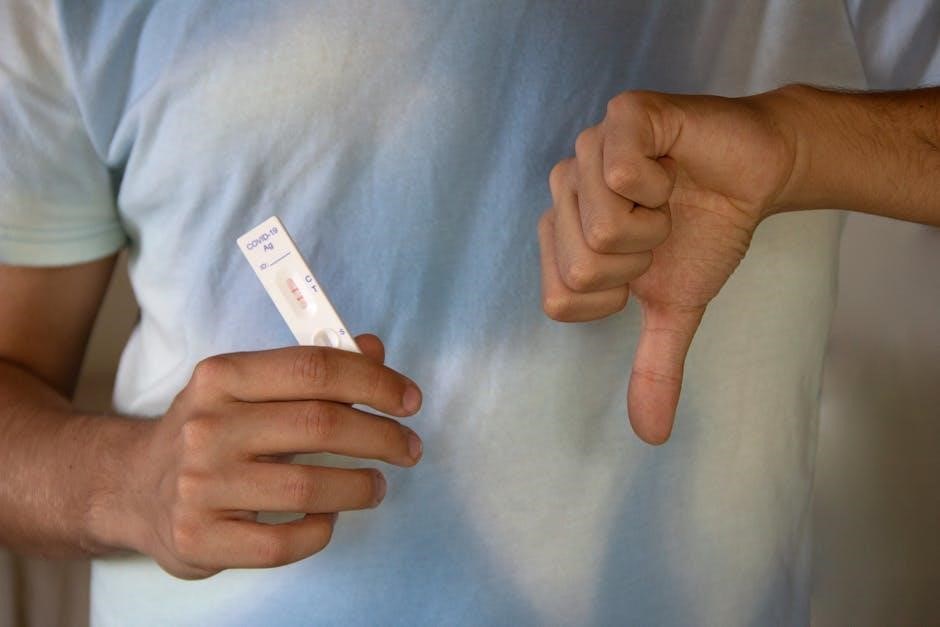
Handling and Interpreting Negative DNA Test Results
Handling negative DNA test results involves consulting healthcare professionals for re-testing, reviewing other diagnostic data, and understanding legal implications to ensure accurate interpretations and appropriate next steps.
Medical Consultation and Re-testing

Medical consultation is crucial when receiving negative DNA test results, as they may not always confirm the absence of a condition. For instance, in HCV testing, RNA levels can fluctuate, and a single negative result does not exclude infection. Similarly, in genetic testing, negative results might not rule out all possibilities, especially if the test targets specific variants. Consulting healthcare professionals helps interpret results in the context of overall health and other diagnostic data. Re-testing is often recommended to confirm findings, particularly in paternity cases where false negatives can occur. Legal and medical experts emphasize the importance of thorough evaluation to ensure accurate conclusions and appropriate next steps.
Legal and Documentary Procedures
Negative DNA test results can have significant legal implications, particularly in paternity or criminal cases. In some instances, negative results may exclude individuals from legal responsibilities, such as child support or inheritance claims. Legal teams often require thorough documentation of test procedures and results to ensure accuracy and admissibility in court. Contesting negative results may involve re-testing or presenting additional evidence. For example, in paternity disputes, a negative result might lead to further investigation of alternative biological fathers. Legal professionals must carefully review all documentation, including test reports and laboratory certifications, to build a robust case. Proper handling of negative results ensures fairness and justice in legal proceedings.
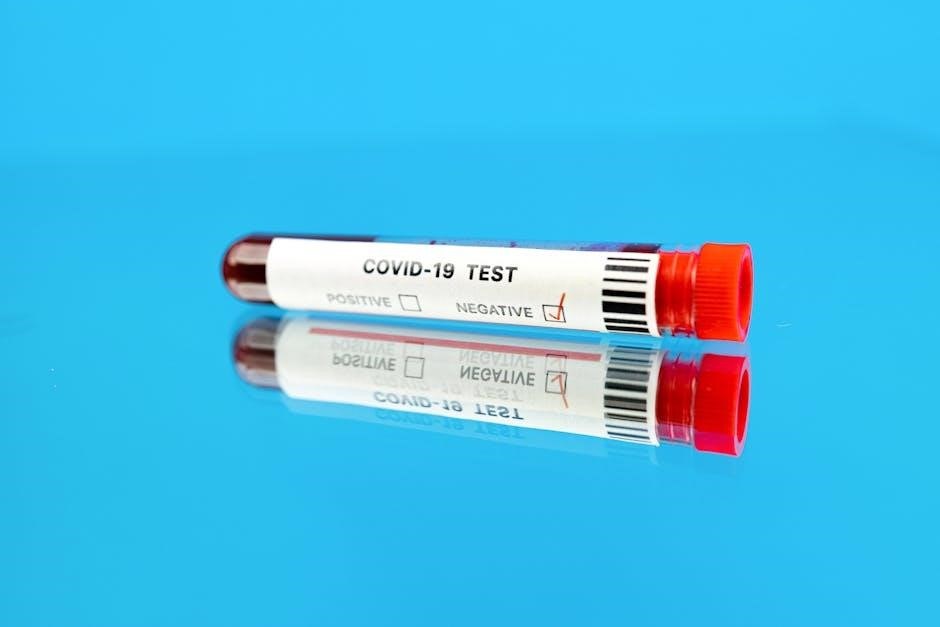
Future Directions and Advances in DNA Testing
Advances in DNA testing aim to enhance accuracy, reducing false negatives through improved technologies and ethical frameworks, ensuring reliable results for legal, medical, and personal applications.
Improving Accuracy to Reduce False Negatives
Efforts to enhance DNA testing accuracy focus on refining methodologies to minimize false negatives. Advanced technologies, such as next-generation sequencing, offer higher sensitivity, detecting rare mutations and improving reliability. Additionally, better sample collection and processing techniques reduce contamination risks and ensure higher-quality DNA for analysis. Regular updates to testing algorithms and markers further contribute to precise results. These advancements are particularly crucial in paternity and criminal cases, where accuracy is paramount. By addressing limitations in current methods, scientists aim to develop more robust tests, reducing the likelihood of misleading negative results and ensuring that DNA testing remains a trusted tool across various applications.
Ethical Considerations in DNA Testing
DNA testing raises significant ethical concerns, particularly regarding privacy, informed consent, and the potential misuse of genetic information. Negative results, while accurate, may still pose challenges, such as psychological distress or misunderstandings about their implications. Ensuring confidentiality is paramount, as DNA data can reveal sensitive personal information. Additionally, the use of DNA testing in legal or medical contexts requires transparent communication about limitations and potential consequences. Ethical guidelines must address issues like discrimination based on genetic results and the need for counseling to help individuals interpret and cope with their outcomes. Balancing scientific progress with individual rights remains a critical focus in the evolving field of DNA testing.